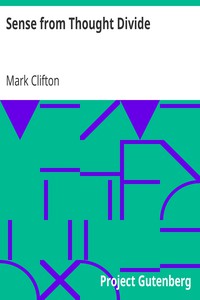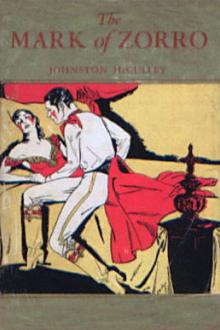Sense from Thought Divide by Mark Clifton (classic books for 13 year olds .txt) 📗

- Author: Mark Clifton
Book online «Sense from Thought Divide by Mark Clifton (classic books for 13 year olds .txt) 📗». Author Mark Clifton
It was, but this was not particularly remarkable. There is no confusing maze of hallways leading to the Personnel Department from the outside. Applicants would be unable to find us if there were. If he had got his bearings out on the street, he could have managed to keep them.
He picked up the nearest chair with his own hands and shifted it so that it would be in tune with the magnetic lines of Earth. I couldn't object. The Chinese had insisted upon such placement of household articles, particularly their beds, long before the Earth's magnetism had been discovered by science. The birds had had their direction-finders attuned to it, long before there was man.
Instead of objecting, the lieutenant and I meekly picked up the table and shifted it to the new position. Sara and Auerbach came in as we were setting the table down. Auerbach gave one quick look at the Swami in his black cloak and nearly white turban, and then looked away.
"Remember semantics," I murmured to him, as I pulled out Sara's chair for her. I seated her to the left of the Swami. I seated Auerbach to the right of him. If the lieutenant was, by chance, in cahoots with the Swami, I would foil them to the extent of not letting them sit side by side at least. I sat down at the opposite side of the table from the Swami. The lieutenant sat down between me and Sara.
The general manager came through the door at that instant, and took charge immediately.
"All right now," Old Stone Face said crisply, in his low, rumbling voice, "no fiddle-faddling around. Let's get down to business."
The Swami closed his eyes.
"Please be seated," he intoned to Old Stone Face. "And now, let us all join hands in an unbroken circle."
Henry shot him a beetle-browed look as he sat down between Auerbach and me, but at least he was coöperative to the extent that he placed both his hands on top of the table. If Auerbach and I reached for them, we would be permitted to grasp them.
I leaned back and snapped off the overhead light to darken the room in an eerie, blue glow.
We sat there, holding hands, for a full ten minutes. Nothing happened.
It was not difficult to estimate the pattern of Henry's mind. Six persons, ten minutes, equals one man-hour. One man-hour of idle time to be charged into the cost figure of the antigrav unit. He was staring fixedly at the cylinders which lay in random positions in the center of the table, as if to assess their progress at this processing point. He apparently began to grow dissatisfied with the efficiency rating of the manufacturing process at this point. He stirred restlessly in his chair.
The Swami seemed to sense the impatience, or it might have been coincidence.
"There is some difficulty," he gasped in a strangulated, high voice. "My guides refuse to come through."
"Harrumph!" exclaimed Old Stone Face. It left no doubt about what he would do if his guides did not obey orders on the double.
"Someone in this circle is not a True Believer!" the Swami accused in an incredulous voice.
In the dim blue light I was able to catch a glimpse of Sara's face. She was on the verge of breaking apart. I managed to catch her eye and flash her a stern warning. Later she told me she had interpreted my expression as stark fear, but it served the same purpose. She smothered her laughter in a most unladylike sound somewhere between a snort and a squawk.
The Swami seemed to become aware that somehow he was not holding his audience spellbound.
"Wait!" he commanded urgently; then he announced in awe-stricken tones, "I feel a presence!"
There was a tentative, half-hearted rattle of some castanets—which could have been managed by the Swami wiggling one knee, if he happened to have them concealed there. This was followed by the thin squawk of a bugle—which could have been accomplished by sitting over toward one side and squashing the air out of a rubber bulb attached to a ten-cent party horn taped to his thigh.
Then there was nothing. Apparently his guides had made a tentative appearance and were, understandably, completely intimidated by Old Stone Face. We sat for another five minutes.
"Harrumph!" Henry cleared his throat again, this time louder and more commanding.
"That is all," the Swami said in a faint, exhausted voice. "I have returned to you on your material plane."
The handholding broke up in the way bits of metal, suddenly charged positive and negative, would fly apart. I leaned back again and snapped on the white lights. We all sat there a few seconds, blinking in what seemed a sudden glare.
The Swami sat with his chin dropped down to his chest. Then he raised stricken, liquid eyes.
"Oh, now I remember where I am," he said. "What happened? I never know."
Old Stone Face threw him a look of withering scorn. He picked up one of the cylinders and hefted it in the palm of his hand. It did not fly upward to bang against the ceiling. It weighed about what it ought to weigh. He tossed the cylinder contemptuously, back into the pile, scattering them over the table. He pushed back his chair, got to his feet, and stalked out of the room without looking at any of us.
The Swami made a determined effort to recapture the spotlight.
"I'm afraid I must have help to walk to the car," he whispered. "I am completely exhausted. Ah, this work takes so much out of me. Why do I go on with it? Why? Why? Why?"
He drooped in his chair, then made a valiantly brave effort to rise under his own power when he felt the lieutenant's hands lifting him up. He was leaning heavily on the lieutenant as they went out the door.
Sara looked at me dubiously.
"Will there be anything else?" she asked. Her tone suggested that since nothing had been accomplished, perhaps we should get some work out before she left.
"No, Sara," I answered. "Good night. See you in the morning."
She nodded and went out the door.
Apparently none of them had seen what I saw. I wondered if Auerbach had. He was a trained observer. He was standing beside the table looking down at the cylinders. He reached over and poked at one of them with his forefinger. He was pushing it back and forth. It gave him no resistance beyond normal inertia. He pushed it a little farther out of parallel with true North. It did not try to swing back.
So he had seen it. When I'd laid the cylinders down on the table they were in random positions. During the seance there had been no jarring of the table, not even so much as a rap or quiver which could have been caused by the Swami's lifted knee. When we'd shifted the table, after the Swami had changed his chair, the cylinders hadn't been disturbed. When Old Stone Face had been staring at them during the seance—seance?, hah!—they were laying in inert, random positions.
But when the lights came back on, and just before Henry had picked one up and tossed it back to scatter them, every cylinder had been laying in orderly parallel—and with one end pointing to true North!
I stood there beside Auerbach, and we both poked at the cylinders some more. They gave us no resistance, nor showed that they had any ideas about it one way or the other.
"It's like so many things," I said morosely. "If you do just happen to notice anything out of the ordinary at all, it doesn't seem to mean anything."
"Maybe that's because you're judging it outside of its own framework," Auerbach answered. I couldn't tell whether he was being sarcastic or speculative. "What I don't understand," he went on, "is that once the cylinders having been activated by whatever force there was in action—all right, call it psi—well, why didn't they retain it, the way the other cylinders retained the antigrav force?"
I thought for a moment. Something about the conditional setup seemed to give me an idea.
"You take a photographic plate," I reasoned. "Give it a weak exposure to light, then give it a strong blast of overexposure. The first exposure is going to be blanked out by the second. Old Stone Face was feeling pretty strongly toward the whole matter."
Auerbach looked at me, unbelieving.
"There isn't any rule about who can have psi talent," I argued. "I'm just wondering if I shouldn't wire General Sanfordwaithe and tell him to cut our order for poltergeists down to five."
I spent a glum, restless night. I knew, with certainty, that Old Stone Face was going to give me trouble. I didn't need any psi talent for that, it was an inevitable part of his pattern. He had made up his mind to take charge of this antigrav operation, and he wouldn't let one bogus seance stop him more than momentarily.
If it weren't so close to direct interference with my department, I'd have been delighted to sit on the side lines and watch him try to command psi effects to happen. That would be like commanding some random copper wire and metallic cores to start generating electricity.
For once I could have overlooked the interference with my department if I didn't know, from past experience, that I'd be blamed for the consequent failure. That's a cute little trick of top executives, generally. They get into something they don't understand, really louse it up, then, because it is your department, you are the one who failed. Ordinarily I liked my job, but if this sort of thing went too far—
But more than saving my job, I had the feeling that if I were allowed to go along, carefully and experimentally, I just might discover a few of the laws about psi. There was the tantalizing feeling that I was on the verge of knowing at least something.
The Pentagon people had been right. The Swami was an obvious phony of the baldest fakery, yet he had something. He had something, but how was I to get hold of it? Just what kind of turns with what around what did you make to generate a psi force? It took two thousand years for man to move from the concept that amber was a stone with a soul to the concept of static electricity. Was there any chance I could find some shortcuts in reducing the laws governing psi? The one bright spot of my morning was that Auerbach hadn't denied seeing the evidence of the cylinders pointing North.
It turned out to be the only bright spot. I had no more than got to my office and sorted out the routine urgencies which had to be handled immediately from those which could be put off a little longer, when Sara announced the lieutenant and the Swami. So I put everything else off, and told her to send them right in.
The Swami was in an incoherent rage. The lieutenant was contracting his eyebrows in a scowl and clenching his fists in frustration. In a voice, soaring into the falsetto, the Swami demanded that he be sent back to Brooklyn where he was appreciated. The lieutenant had orders to stay with the Swami, but he didn't have any orders about returning either to Brooklyn or the Pentagon. I managed, at last, to get the lieutenant seated in a straight chair, but the Swami couldn't stay still long enough. He stalked up and down the room, swirling his slightly odorous black cloak on the turns. Gradually the story came out.
Old Stone Face, a strong advocate of Do It Now, hadn't wasted any time. From his home he had called the Swami at his hotel and commanded him to report to the general manager's office at once. Apparently they both got there about the same time, and Henry had waded right in.
Apparently Henry, too, had spent a restless night. He accused the Swami of inefficiency, bungling, fraud, deliberate insubordination, and a few other assorted faults for having made a fool out of us all at the seance. He'd as much as commanded the Swami to cut out all this shilly-shallying and get down to the business of activating antigrav cylinders, or else. He hadn't been specific about what the "or else" would entail.
It was up to me to pick up the pieces, if I could.
"Now I'm sure he really didn't mean—" I began to pour oil on the troubled waters. "With your deep insight, Swami—The fate of great martyrs throughout the ages—" Gradually the ego-building phrases calmed him down. He grew willing to listen, if for no more than the anticipation of hearing more of them.
He settled down into the crying chair at last, and I could see his valence shifting from outraged anger to a vast and noble forgiveness. This much was not difficult. To get him to coöperate, consciously and enthusiastically, well that might not be so easy.
Each trade has its own special techniques. The analytical chemist has a series of routines he tries when he wishes to reduce an unknown compound to its constituents. To the chemically uneducated, this may appear to be a fumbling, hit or miss, kind of procedure. The personnel man, too, has his series of techniques. It may appear to be no more than random, pointless conversation.
I first tried the routine process of reasoning. I didn't expect it to work; it seldom does, but it can't be eliminated until it has been tested.
"You must understand," I said slowly, soothingly, "that our intentions are constructive. We are simply trying to apply the scientific method to something which has, heretofore, been wrapped in mysticism."
The shocked freezing of his facial muscles told me that reasoning had missed its mark. It told me more.
"Science understands nothing, nothing at all!" he snapped, "Science tries to reduce everything to test tubes and formulae; but I am the instrument of a mystery which man can





Comments (0)